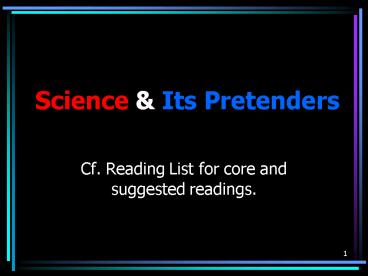Science PowerPoint PPT Presentation
1 / 27
Title: Science
1
Science Its Pretenders
- Cf. Reading List for core and suggested readings.
2
Topics
- The Amazing Power of Science A Very Brief
Reflection - Science Pseudoscience Poppers Demarcation
Criterion - Comments on Poppers Falsificationism
- Hypothesis Evidence
- Criteria of Adequacy
- Further Example Evolution vs. Creationism
3
The Amazing Power of Science A Very Brief
Reflection
- Influence every aspect of our lives tremendously.
- Change the world with an exceedingly fast pace.
- Produce scientific knowledge with astounding
breath and depth.
4
Science Pseudoscience Poppers Demarcation
Criterion
- About 100 yrs ago, people were deeply interested
in theories like - Alfred Adlers (1870-1937) individual psychology
- An inborn sense of inferiority
- Strive for superiority
- Seemed to be able to explain everything within
its field of inquiry!
5
- Albert Einsteins (1879-1955) theory of
relativity - Relativistic spacetime e.g. simultaneity is
relative. - E mc2
- One of the two pillars of modern physics.
6
- Both claimed to be scientific.
- Science signifies __________, ___________,
___________. - Yet, Karl Popper (1902-1994) held that theories
like Alders is actually not scientific.
7
- He raised the demarcation problem
- When should a theory be ranked as scientific?
- Is there a criterion for the scientific status of
a theory?
Scientific / Pseudoscientific
8
- His criticism of theories like Adlers
- Adlers theory could easily explain two
diametrically opposite cases, e.g. - A man pushes a child into the water with the
intention of drowning it. - A man sacrifices his life in an attempt to save
the child. - How?
- By appealing to the idea of inferiority feeling,
. . .
9
- Its explanatory power is just a disguise of its
interpreting power. - Points for analysis in your paper, e.g. How is
this interpreting power harmful to a theory?
(Hint meaning shift of some key concepts) - This apparent strength - capable of explaining
everything - is in fact a weakness.
10
- Arthur Eddingtons confirmation (1919) of
Einsteins theory was different - The light-bending prediction
- Might be refuted not always confirmatory!
11
- Consequently, Popper proposed
- The criterion of the scientific status of a
theory is its - falsifiability,
- or refutability,
- or testability.
- Is this criterion adequate?
12
Comments on Poppers Falsificationism
- Two senses of falsifiability
- Falsifiability as a logical property of
statements - Falsifiable, e.g.
- It never rains on Wednesdays.
- All substances expand when heated.
13
- Unfalsifiable, e.g.
- Luck is possible in sporting speculation.
- There is a ghost in this room which cannot be
sensed, directly or indirectly. - Falsifiability as a methodological prescription
of how scientists should act - E.g. try to make all substances expand when
heated unfalsifiable in this sense. - But both these senses are problematic!
14
- 1. The logical sense
- Too _______
- Suppose T is a theory having testable
predictions. - Let C be, say, there is a ghost in this room
which cannot be sensed, directly or indirectly. - Then T C has testable predictions and thus
scientific in the logical sense!
15
- 2. The methodological sense
- Too ________
- E.g. the discovery of Neptune
- Newtons theory of gravitation wrongly predicted
the orbit of Uranus abandoned it? - In fact, some scientists tried to rescue Newtons
theory by postulating the existence of an unknown
planet. - Neptune was finally discovered at almost the
exact place and time as predicted.
16
(No Transcript)
17
- The failure of Popper's criterion throws up an
important question - Is it possible to find some common features
shared by all the sciences, but not shared by
anything else? - Has science essential features?
- Popper assumed that the answer was yes.
18
- Ludwig Wittgenstein (1889-1951) argued against
essentialism. - Family resemblance concepts like game have no
essential features. - Cf. His Philosophical Investigations, sections
66-7.
19
GAMES
- A B C D E
F - 1 ------------- --------
------- - 2 ------------------------------
- 3 ------- -------
------- - 4 -----------------------
-------------- - 5 -------------- ---------------
FEATURES
20
- The same may be true of science.
- Note the heterogeneity of science.
- If so, no simple criterion for demarcating
science from pseudoscience. - How actually should we choose among hypotheses
scientific or pseudoscientific?
21
Hypothesis Evidence
- The logic of hypothesis testing
Main hypothesis ( background assumptions)
22
- Discussion - a daily example
- The problem
- A lamp does not light up.
- Hypothesis
- Implication
- Test
- Result
23
- Positive evidence does not prove conclusively
that a hypothesis is correct. - There are always competing hypotheses that have
the same set of positive evidence.
24
- Negative evidence does not prove conclusively
that a hypothesis is incorrect. - A Modus Tollens
- (Hypothesis H Assumptions A) ? Implication I
- ? I
. - ? (H A)
- So maybe the trouble comes from A.
25
- Example
- Columbus and the negative evidence against the
flat Earth hypothesis - Supporting the round Earth hypothesis
26
- Saving the flat Earth hypothesis
- Assumption light travels in curved lines.
- Facts alone cannot decide which hypothesis to
accept. - Criteria of Adequacy are needed.
27
- Discussion
- What do you think are the criteria of adequacy?

